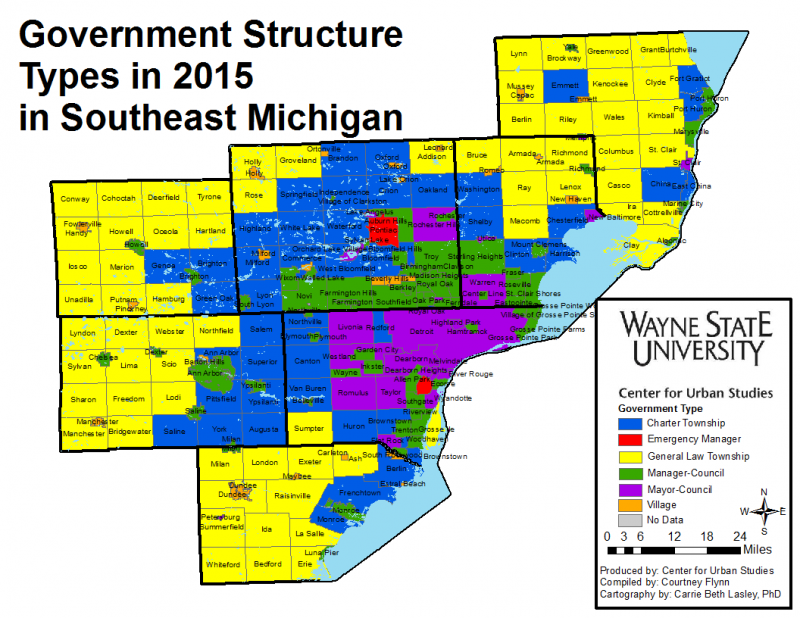In this post we examine the types of government structures that exist in Southeastern Michigan. Throughout Michigan there are five types of municipalities including: Mayor-Council and Manager-Council (both of which are for cities), Charter Township and General Law Township, and villages. In addition to showing what type of government structures exist in Southeastern Michigan in a map below, we also detail how those different structures work and offer some reasons a community chooses one structure rather than another.
Wayne County has the largest number of municipalities with a Mayor-Council form of government, while the more rural communities on the outskirts of the region are predominantly General Law Townships. In total, there are 22 municipalities with a Mayor-Council form of government, in this form the mayor serves as the chief administrator for the city), 10 of which are located in Wayne County. It is General Law Townships though that are the most common form of government in the region, with 72 communities being organized as one of Michigan’s earliest form of governments.
Charter Townships make up 19 percent (41) of government structures in Southeastern Michigan while Council-Manager forms of government makeup 29 percent (65) of the types of government structure that exists in the region. There are 20 villages in the region.
While Wayne County has more communities that operate with a Council-Manager form of government, and the largest number of cities, General Law Townships predominate along the outer edges of the region.

The Differences
As noted, General Law Townships are the most common form of government structure in Southeastern Michigan; all townships are General Law Townships unless incorporated in a Charter Township. General Law Townships were given the option to receive a Charter Township status beginning in 1947 when the State Legislature approved the Charter Township Act. This classification, according to the Michigan Township Association, allows for a more streamlined administration.
According to the Michigan Township Association, townships (both general law and charter) can only exercise powers given to them by state law. All townships are required to collect taxes, administer their local elections and perform property assessments. They also have the option to enact and enforce ordinances, offer local fire and police protection services, and operate parks and recreation programs, among other things, according to the Michigan Township Association. Additionally, all townships are governed by a Supervisor, Clerk, Treasurer and two or four trustees.
In terms of levying millages, General Law Townships are allocated at least 1 mill from the 15/18 mills that counties, townships, public schools and intermediate school districts receive, according to the Macomb Township website. Charter Townships though do not receive this same millage allocation. Rather, if they were chartered by a referendum, they can levy up to 5 mills. But if a township was chartered by a board resolution after 1978, then the voters must vote on whether or not a proposed 5 mills can be levied. Under either circumstance, townships can also levy up to 10 mills, but this must be approved by the voters, according to the Macomb Township website.
Townships are part of Michigan’s early history and began to be created in 1790 throughout the Midwest region as a way to help govern land throughout what is now the Midwest region, according to the National Township Association. In the Midwest, according to the National Township Association, townships are typically more rural, as we saw with majority of the General Law Townships being located on the outskirts of the seven-county. Also, according to the Michigan Township Association, a Charter Township status can help prevent a township from being annexed by a neighboring city. Several weeks ago we took a look at how the city of Detroit became the size it is today through annexation. When looking at the map in this post we see that the only township touching the Detroit border is Redford Township and that is a Charter Township. Additionally, we see that throughout Macomb, Oakland and Wayne counties, where the majority of the region’s cities are located, the majority of the cities border Charter Townships, as opposed to General Law Townships.
Cities
Unlike townships, cities must not only perform the same state mandated functions as townships, but they must also provide their own services, such as snow plowing, police and fire services (these services can be contracted out or shared between municipalities). According to the Michigan Municipal League, cities are given a greater amount of independence in how they regulate, in large part because of the Home Rule City Act; this allows cities to enact a charter which provides the framework for how that particular city functions.
The City of Detroit is the most recognizable example of the Strong Mayor type of city government in the region. A Strong Mayor type of government is one in which the mayor acts as the city’s top administrator, serves on a full-time basis, and has the authority to appoint and remove top officials. He or she also typically has some sort of veto power, but the council is the acting legislative body, according to the Michigan Municipal League.
In the Council-Manager form of government the council appoints a chief administrative officer, often known as the City Manager. This person is professionally trained on the day-to-day operations of a city and is often looked to for recommendations by the council regarding policy making.
Villages
In addition to townships and cities, there are also villages in the state of Michigan. Villages, which are the least common structure of government in Southeastern Michigan, also come in two forms: General Law and Home Rule. General Law villages, which are the most common, have a village president, which is an elected position, but it is the department heads who typically oversee the day-to-day administrative functions of the municipality. With a Home Rule Village, the president does not need to be elected by the citizens but can be appointed by the council; this person is often referred to as the village manager, according to the Michigan Municipal League.